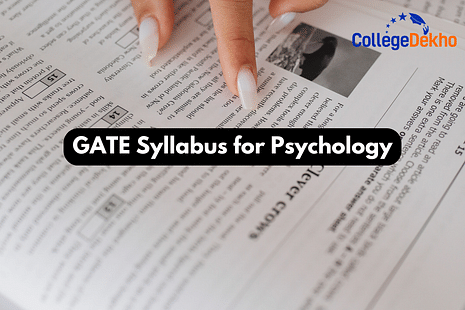GATE 2025 syllabus for Psychology has been released by IIT Roorkee and it involves topics such as Sensation and Perception, Memory and Forgetting, etc. To qualify the GATE exam for Psychology with good marks, you must be well aware of the complete GATE Psychology syllabus.

GATE 2025 Syllabus for Psychology (XH-C4):
IIT Roorkee has published the GATE Psychology syllabus on its official website. The GATE 2025 syllabus Psychology includes various subjects such as Approaches to Research, Memory and Forgetting, Language and Cognition, Moral and Aging Development, etc. You will be able to download the syllabus of GATE Psychology on this page. If you are going to sit for the Psychology GATE exam, then you must be well-versed in the Psychology GATE syllabus. IIT Roorkee will structure the question paper as per the GATE Psychology paper pattern and the syllabus.
Throughout this article, we will be discussing various details such as the
GATE 2025 syllabus pdf
, important chapters, best books, etc. After you qualify GATE exam for Psychology, you will be able to get admission to one of the reputed
GATE 2025 participating colleges
. To get more information about the GATE 2025 syllabus for Psychology, keep reading.
GATE 2025 Psychology Syllabus PDF
As discussed above, IIT Roorkee has released the GATE Psychology syllabus pdf on its website. The link for the GATE Psychology syllabus PDF download can be found below:-
GATE 2025 Psychology Chapter-Wise Syllabus
As the GATE 2025 exam taker, you must make sure to have all the details about the GATE exam Psychology syllabus. The table below holds the details about the GATE Psychology syllabus:-
Section | Topic | Subtopics |
|---|---|---|
C5.1 Research Methods and Statistics | C5.1.1 Approaches to Research | Philosophical worldviews & criteria involved in approach, Quantitative & qualitative research, Mixed methods |
C5.1.2 Designing Research | Research problems, purpose statement, variables and operational definitions, hypothesis, sampling | |
C5.1.3 Nature of Quantitative & Qualitative Research | Structured, semi-structured interviewing, self-completion questionnaires, observation, experimental designs, quasi-experimental, field studies, focus groups, narratives, case studies, ethnography | |
C5.1.4 Ethics in Conducting and Reporting Research | Ethical considerations in research methodology | |
C5.1.5 Statistics in Psychology | Measures of central tendency, dispersion, normal probability curve, parametric and non-parametric tests, effect size, power analysis | |
C5.1.6 Correlational Analysis | Correlation (product moment, rank order), partial correlation, multiple correlation, regression, factor analysis | |
C5.1.7 Experimental Designs | ANOVA, randomized block designs, repeated measures, cohort studies, MANOVA, ANCOVA, single-subject designs | |
C5.2 Psychometrics | Foundations of Psychological Measurement | Scales and items construction, analysis of test items, test standardization, reliability, validity, norms |
Applications of Psychological Testing | Applications in education, counseling, clinical, organizational, and developmental settings | |
C5.3 Biological and Evolutionary Basis of Behaviour | Heredity and Behaviour | Evolution, natural selection, nervous system, structure of the brain, neurotransmitters, endocrine system, biological basis of motivation |
Physiological Psychology Methods | Invasive and non-invasive methods (EEG, microelectrode studies, scanning methods) | |
Genetics and Behaviour | Chromosomal anomalies, nature-nurture controversy, twin and adoption studies | |
C5.4 Perception, Learning, Memory and Forgetting | Sensation and Perception | Sensory thresholds, sensory adaptations, gestalt principles, depth perception, illusions |
Theories of Learning | Classical conditioning, operant conditioning, social learning, cognitive learning | |
Memory and Forgetting | Encoding, storage, retrieval, interference theory, decay theory, physical aspects of memory | |
C5.5 Cognition: Thinking, Intelligence and Language | Basic Elements of Thought | Concepts, propositions, imagery, problem solving methods, metacognitive processing |
Theories of Intelligence | Spearman, Thurstone, Jensen, Cattell, Gardner, Sternberg, emotional intelligence | |
Language and Cognition | Measuring intelligence, differences between intelligence, aptitude, and creativity | |
C5.6 Personality | Theories of Personality | Psychoanalytic, behaviorist, social cognitive, humanism, trait and type theories |
Biology of Personality | Assessment methods, biological influences | |
C5.7 Motivation, Emotion and Stress and Coping | Motivation Theories | Instinct, drive-reduction, arousal, incentive, humanistic theories, intrinsic motivation |
Emotions and Stress | Theories of emotion (James-Lange, Cannon-Bard, Schachter-Singer, Lazarus), stressors, general adaptation syndrome, coping strategies | |
C5.8 Social Psychology | Social Perception and Influence | Attribution, impression formation, conformity, compliance, obedience, attitude formation |
Prejudice and Discrimination | Cognitive dissonance, aggression, power, prosocial behavior, group dynamics, leadership theories | |
C5.9 Development Across the Life Span | Human Development | Nature vs nurture, prenatal development, cognitive and psychosocial development in infancy, childhood, adolescence, adulthood |
Moral and Aging Development | Theories of aging, moral development | |
C5.10 Applications of Psychology | Psychological Disorders | Assessment and diagnosis, PTSD, psychotherapies (psychodynamic, behavioral, cognitive, biological) |
Applications in School and Organization | Motivation and learning theories in education, counseling, leadership in organizations, territoriality issues |
GATE 2025 General Aptitude Syllabus for Psychology
The section on General Aptitude in the GATE Psychology syllabus plays a major role in contributing to your success in the exam. Therefore, you must make sure to know details about the general aptitude syllabus of GATE Psychology. Find the details about the GATE 2025 syllabus Psychology in the table below:-
Name of the chapter | Name of the topic |
|---|---|
Verbal Aptitude |
|
Quantitative Aptitude |
|
Analytical Aptitude | Logic: deduction and induction, Analogy, Numerical relations and reasoning |
Spatial Aptitude | Transformation of shapes: translation, rotation, scaling, mirroring, assembling, and grouping paper folding, cutting, and patterns in 2 and 3 dimensions. |
GATE 2025 Psychology Syllabus Important Chapters
In GATE 2025 Psychology, certain chapters consistently carry more weight due to their relevance in the field and frequency in past Psychology GATE exams. Topics such as Research Methods and Statistics (focusing on quantitative and qualitative research designs, and statistical methods), Biological and Evolutionary Basis of Behavior (including brain structures, neurotransmitters, and genetic influences), Perception, Learning, Memory, and Forgetting (covering theories of learning, memory processes, and perception), etc. are quite important as questions have been asked before from these sections. Provided below are the important chapters for the GATE Exam Psychology syllabus:-
Sections | Topics | Important Topics |
|---|---|---|
Research Methods and Statistics | Quantitative and Qualitative Research Design, Hypothesis Testing | Research methodologies, statistics in psychology, and experimental designs |
Biological and Evolutionary Basis of Behavior | Nervous System, Neurotransmitters, Brain Functions | Genetic and neurophysiological basis of behavior |
Perception, Learning, Memory, and Forgetting | Sensation, Theories of Learning, Memory Processes | Sensory processes, classical and operant conditioning, memory retrieval |
Cognition: Thinking, Intelligence, and Language | Intelligence Theories, Problem Solving | Cognitive processes, intelligence testing, decision-making |
Personality and Social Psychology | Personality Theories, Social Influence, Group Dynamics | Personality assessment, attitudes, and influence of social environments on behavior |
Sample Question Papers for GATE 2025 Psychology Paper
The best way to assess the preparation levels before appearing for the GATE Exam Psychology syllabus is to solve the previous year's question papers, mock test papers, and sample test papers. The best way to measure the preparations is to attempt the GATE 2025 Psychology sample test papers available on the official website of the IISC Bangalore. To start downloading the GATE 2025 sample question paper for the Psychology exam, the students must click on the direct link provided below:-
You will also be able to find the answer key to the sample question paper at the end of the PDF.
GATE 2025 Psychology Sample Questions
1. The theory of psychoanalysis is founded on which of the following?
(A) Psychoanalysis is based on experimental research and laboratory studies.
(B) Psychoanalysis is based on detailed case studies of people.
(C) Psychoanalysis is based on the analysis of dreams and unconscious thoughts.
(D) Psychoanalysis is based on statistical surveys and population studies.
2. If "RAMAN" is encoded as 52 and "MAP" as 33, what is the encoding for "CLICK"?
(A) "CLICK" encodes as 47, applying principles of letter substitution and addition.
(B) "CLICK" encodes as 43, applying principles of letter substitution and addition.
(C) "CLICK" encodes as 39, based on the sum of the positions of the letters in the alphabet.
(D) "CLICK" encodes as 55, following a pattern of assigning numbers to letters and adding them.
3. The theory of psychoanalysis is founded on which of the following?
(A) Psychoanalysis is based on experimental research with animals.
(B) Psychoanalysis is based on statistical analysis of large groups of people.
(C) Psychoanalysis is based on detailed case studies of people.
(D) Psychoanalysis is based on surveys and questionnaires.
4. In the Darwinian sense, what term refers to the ability to survive and produce fertile offspring?
(A) Adaptation refers to the process by which organisms evolve traits that improve survival.
(B) Evolution refers to the gradual change of species over generations.
(C) Fitness refers to survival and reproductive success of organisms.
(D) Natural selection refers to the mechanism by which individuals with advantageous traits are more likely to survive and reproduce.
5. When Monkey-A sees Monkey-B, what is this called?" with the correct answer included:
(A) Cognitive imitation involves learning by observing others' actions and objectives.
(B) Social learning is the process by which individuals learn from the behavior and actions of others in a social group.
(C) Observational learning is the acquisition of skills or knowledge by watching others perform tasks.
(D) Behavioral conditioning occurs when an individual learns through reinforcement and punishment from others' actions.
GATE 2025 Psychology Exam Pattern
The exam of the GATE 2025 syllabus Psychology will be structured based on the specified GATE Psychology paper pattern. You can find the details about the GATE 2025 Psychology exam pattern below:-
Specifications | Details |
|---|---|
Mode of the exam | Online (Computer Based) |
Exam Duration | 3 hours |
Exam section |
|
Questions type |
|
Total number of marks | 100 marks |
Marking scheme | 1 or 2 marks per question |
Negative Marking |
|
Best Books for GATE 2025 Psychology Exam
If you desire to succeed in the GATE 2025 Psychology exam with a good score, then you must ensure that you have your hands on the best books to prepare from. After doing a bit of research on what supposedly could be the best books for the PG-level GATE exam for Psychology, we have come up with a list of the following books that should help you achieve your goals:-
- MCQs in Psychology - Objectives for JRF/UGC NET and Other Competetive Examinations
- Question Bank Psychology - SLET/UGC NET/SPSC/UPSC/Other Higher Grade Examinations
- NTA UGC NET Psychology Paper-II (recent edition)
- Objective Psychology (Popular Master Guide) Paperback
Related Articles:
For more information and updates on the GATE 2025 Psychology Exam, Stay tuned with CollegeDekho!
Are you feeling lost and unsure about what career path to take after completing 12th standard?
Say goodbye to confusion and hello to a bright future!

GATE Previous Year Question Paper
Was this article helpful?





















Similar Articles
CUET UG English Expected Cutoff 2025
CUET UG History Expected Percentile Score 2025
Shyam Lal College CUET Cutoff 2025: Expected Cutoff based on Previous Trends
Daulat Ram College CUET Cutoff 2025: Expected Cutoff Based on Previous Trends
Central University of Haryana PG Merit List 2025: Release Date, Time, PDF Download Link, Round 1 Counselling Dates
CUET UG General Test Expected Percentile Score 2025